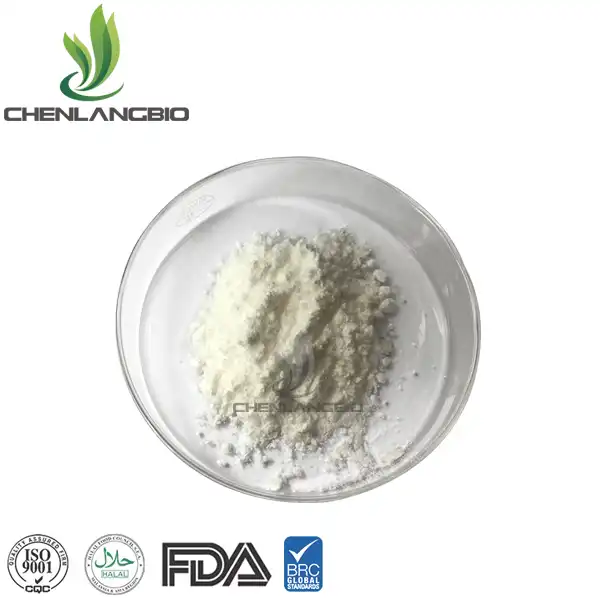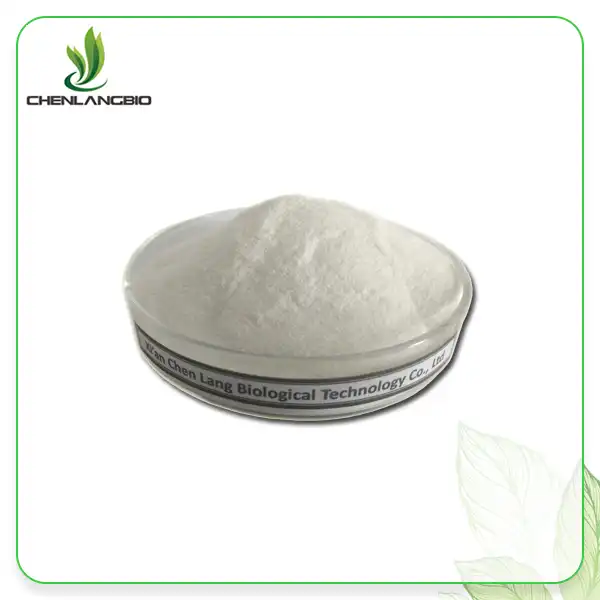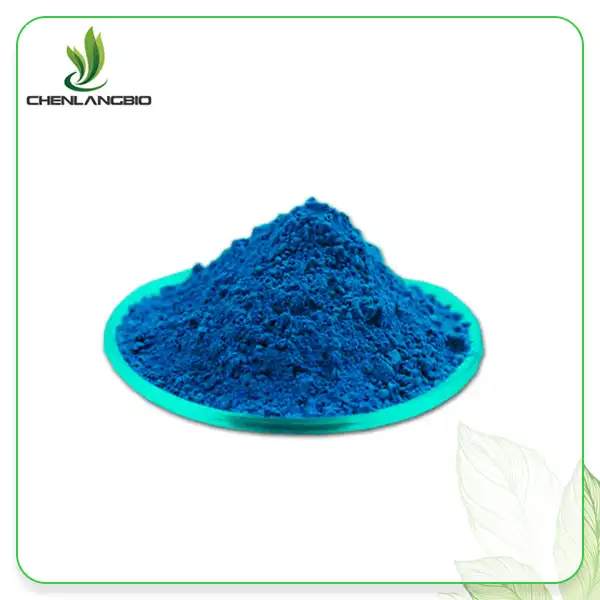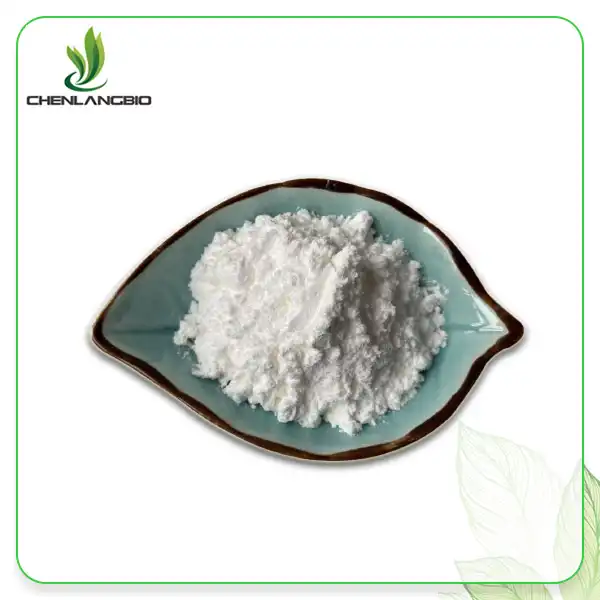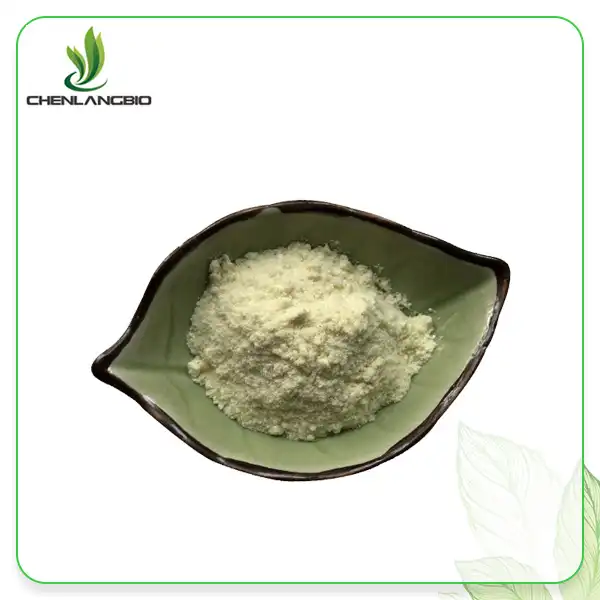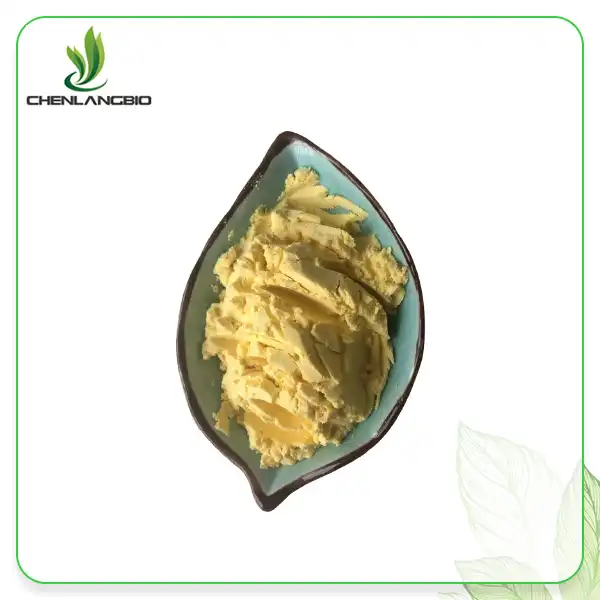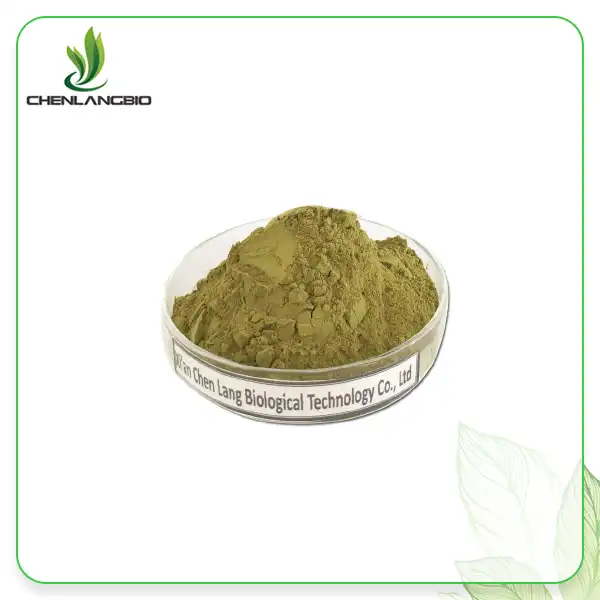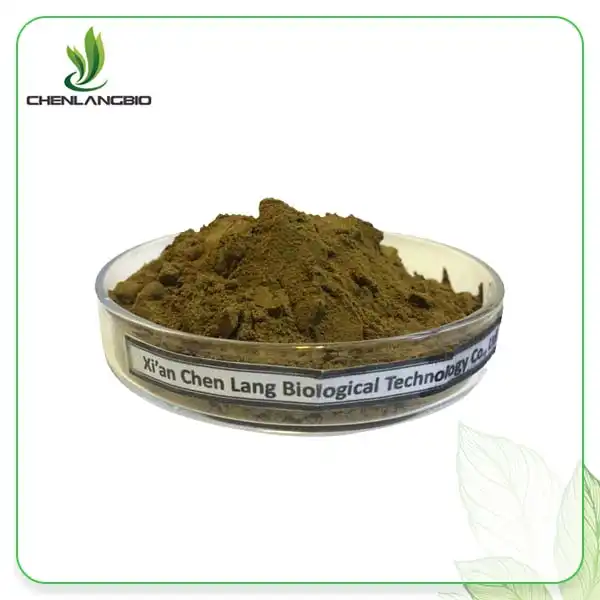Can Resveratrol Powder Interact with Medications?
2025-04-11 11:04:19
Resveratrol, a powerful natural compound found in grapes, peanuts, and Polygonum cuspidatum, has gained significant attention for its potential health benefits. However, an important question arises for individuals taking prescription medications: Can resveratrol extract powder interact with medications? The answer is yes - resveratrol can potentially interact with certain medications, particularly blood thinners, antiplatelet drugs, and some medications metabolized by the liver. These interactions occur because resveratrol may alter how these medications are processed in the body, potentially enhancing or reducing their effects. Understanding these interactions is crucial for safely incorporating this beneficial supplement into your health regimen.
Mechanisms of Resveratrol-Drug Interactions
Cytochrome P450 Enzyme System Effects
Resveratrol Extract Powder has been shown to influence the cytochrome P450 enzyme system, which is responsible for metabolizing many medications in the liver. Studies indicate that resveratrol can inhibit several CYP enzymes, particularly CYP3A4, which is involved in the metabolism of approximately 50% of all prescription medications. When resveratrol inhibits these enzymes, it can lead to higher blood levels of medications that are normally broken down by these pathways. This mechanism is particularly significant for medications with a narrow therapeutic window, where small changes in blood concentration can lead to either therapeutic failure or toxicity. For example, resveratrol may increase the blood levels of certain statins, potentially enhancing both their cholesterol-lowering benefits and their side effects. The molecular structure of resveratrol (C14H12O3) enables it to bind to these enzyme systems, creating these complex pharmacokinetic interactions that must be carefully considered when used alongside prescription medications.
Blood Thinning and Antiplatelet Effects
The antiplatelet properties of resveratrol extract powder (CAS: 501-36-0) can potentially enhance the effects of blood-thinning medications. Research has demonstrated that resveratrol inhibits platelet aggregation through multiple mechanisms, including the inhibition of thromboxane A2 production and modulation of cyclooxygenase enzymes. When combined with prescription anticoagulants like warfarin or antiplatelet drugs such as aspirin and clopidogrel, this additive effect may increase the risk of bleeding complications. This interaction is particularly important for individuals with cardiovascular conditions who may already be taking these medications as part of their treatment regimen. The natural antioxidant properties of resveratrol that make it beneficial for cardiovascular health are the same properties that can lead to these drug interactions. Clinical observations have shown that patients combining high-dose resveratrol supplements with anticoagulant therapy may experience prolonged bleeding times and require more careful monitoring of their coagulation parameters.
Absorption and Bioavailability Alterations
Resveratrol Extract Powder can significantly influence the absorption and bioavailability of various medications through several mechanisms. One key interaction involves P-glycoprotein (P-gp), a transport protein that pumps foreign substances out of cells. Resveratrol has been shown to inhibit P-gp activity, potentially increasing the absorption of drugs that are normally limited by this protein. Additionally, resveratrol's solubility characteristics (insoluble in water but soluble in ethanol and methanol) affect how it interacts with other compounds in the digestive system. This can alter the dissolution and absorption rates of co-administered medications, particularly those with similar physicochemical properties. For medications that require specific absorption conditions or have complex formulations, the presence of resveratrol may disrupt their intended pharmacokinetic profile. The 98% pure resveratrol extract supplied by Chen Lang Bio Tech is particularly potent in these interactions due to its high concentration, making it essential to maintain appropriate timing between resveratrol supplementation and medication administration to minimize potential interference with drug absorption processes.
Specific Medication Classes Affected by Resveratrol
Cardiovascular Medications
Resveratrol Extract Powder has shown significant interactions with various cardiovascular medications, requiring careful consideration for patients with heart conditions. Calcium channel blockers, commonly prescribed for hypertension and angina, may experience enhanced effects when combined with resveratrol due to the inhibition of CYP3A4 enzymes that metabolize these drugs. This interaction can potentially lead to excessive blood pressure reduction and related symptoms like dizziness or fainting. Similarly, the combination of resveratrol with antiarrhythmic medications may alter heart rhythm control in unpredictable ways. The polyphenolic structure of resveratrol (molecular weight: 228.24) contributes to its antioxidant properties, which while beneficial for cardiovascular health generally, can complicate medication management. Chen Lang Bio Tech's pharmaceutical-grade resveratrol (98% purity) is particularly potent, making these interactions more pronounced compared to dietary sources like red wine. For patients taking ACE inhibitors or angiotensin receptor blockers, resveratrol may potentiate their blood pressure-lowering effects through complementary vascular relaxation mechanisms. Healthcare providers should monitor patients closely when introducing resveratrol supplements to existing cardiovascular medication regimens, potentially adjusting dosages to accommodate these pharmacodynamic interactions.
Chemotherapy and Immunosuppressant Drugs
Resveratrol extract powder has demonstrated complex interactions with chemotherapy agents and immunosuppressive medications that warrant careful consideration. The potent antioxidant properties of resveratrol might theoretically interfere with certain chemotherapy drugs that rely on oxidative mechanisms to destroy cancer cells. Specifically, alkylating agents and platinum compounds may have reduced efficacy when combined with high-dose resveratrol supplementation. Conversely, resveratrol has shown synergistic effects with some chemotherapeutic agents, potentially enhancing their anti-cancer activity through mechanisms like downregulation of multidrug resistance proteins. With immunosuppressants such as cyclosporine and tacrolimus, resveratrol may interfere with drug metabolism through CYP3A4 inhibition, potentially leading to elevated blood levels and increased risk of toxicity. The pharmaceutical-grade resveratrol (98% purity) from Xi An Chen Lang Bio Tech, extracted from Polygonum cuspidatum, contains the active ingredient in concentrations significantly higher than dietary sources, making these interactions more pronounced. For transplant recipients or patients undergoing cancer treatment, it's essential that healthcare providers evaluate the potential risks and benefits of resveratrol supplementation in the context of their existing medication regimen. Properly timed administration with appropriate intervals between resveratrol and these medications may help mitigate interaction risks while still providing resveratrol's health benefits.
Anti-Inflammatory and Pain Medications
Resveratrol Extract Powder has demonstrated significant interactions with various anti-inflammatory and pain medications, potentially altering their effectiveness and safety profiles. When combined with non-steroidal anti-inflammatory drugs (NSAIDs) like ibuprofen or naproxen, resveratrol may enhance their anti-inflammatory effects through complementary inhibition of pro-inflammatory pathways. This synergistic action stems from resveratrol's natural ability to inhibit cyclooxygenase enzymes and reduce inflammatory mediators, similar to the mechanism of many NSAIDs. While this might suggest enhanced therapeutic benefit, it also raises concerns about increased gastrointestinal side effects and bleeding risks. The high-purity resveratrol (98%) supplied by Chen Lang Bio Tech, extracted from Polygonum cuspidatum, contains concentrated active compounds that may potentiate these effects more significantly than dietary sources. For patients taking corticosteroids, resveratrol may influence their metabolism through cytochrome P450 interactions, potentially altering drug clearance rates and therapeutic effects. Additionally, resveratrol's natural analgesic properties, as noted in the product information regarding its "fever-reducing and analgesic effect," may complement prescription pain medications but also complicate pain management approaches. Healthcare providers should consider these interactions when prescribing pain management strategies for patients already supplementing with resveratrol, particularly at the higher concentrations found in commercial supplements rather than dietary sources.
Maximizing Benefits While Minimizing Risks
Consultation with Healthcare Providers
Before incorporating Resveratrol Extract Powder into your regimen alongside prescription medications, consulting healthcare providers is absolutely essential. Medical professionals can conduct a comprehensive evaluation of your current medication profile to identify potential interaction risks specific to your situation. This evaluation becomes particularly critical given resveratrol's known effects on cytochrome P450 enzymes and its influence on blood coagulation. Physicians may recommend therapeutic drug monitoring when combining resveratrol with medications that have narrow therapeutic windows, such as anticoagulants or certain anticonvulsants. When discussing resveratrol supplementation with your healthcare provider, bring detailed information about the specific product you intend to use, including the concentration (such as Chen Lang Bio Tech's 98% pure formulation) and dosage plans. This specificity allows for more accurate assessment of potential interactions based on the potency of the supplement. Some healthcare providers may suggest staggered administration schedules, separating resveratrol intake from medication times by several hours to minimize absorption interactions. Additionally, a qualified healthcare professional can help develop a monitoring plan to assess both the benefits of resveratrol supplementation and any potential adverse effects that might emerge from drug interactions, ensuring that your combined regimen remains both effective and safe for your particular health circumstances.
Proper Timing and Dosage Considerations
The timing and dosage of resveratrol extract powder relative to medications can significantly impact potential interactions. Establishing an optimal schedule requires careful consideration of pharmacokinetic profiles of both the supplement and prescription medications. For medications metabolized by the CYP3A4 enzyme system, separating resveratrol intake by at least 2-4 hours may help minimize interaction potential. This timing strategy allows one compound to be substantially processed before introducing the other, reducing competition for metabolic pathways. Regarding dosage, starting with lower amounts of resveratrol and gradually increasing based on tolerance and monitoring can help identify any adverse effects early. Chen Lang Bio Tech's high-purity resveratrol (98%) is particularly potent, making this incremental approach especially important. The standard minimum order quantity (MOQ) of 1kg from suppliers like Chen Lang Bio may provide enough material for extended supplementation, but proper dosing should be determined individually rather than based on package size. For medications with significant absorption concerns, taking resveratrol with or without food in relation to medication timing may be an important consideration as well. Since resveratrol is insoluble in water but soluble in alcohols, its absorption profile differs substantially from water-soluble medications. This solubility characteristic affects not only its own bioavailability but potentially that of co-administered drugs, making the timing of administration a critical factor in minimizing unwanted interactions while maximizing the therapeutic benefits of both the medication and resveratrol.
Monitoring for Interaction Signs and Symptoms
Vigilant monitoring for potential interaction signs between Resveratrol Extract Powder and medications is crucial for ensuring safety during supplementation. Patients should be educated about specific symptoms that might indicate problematic interactions, rather than merely attributing new symptoms to either the medication or the supplement alone. For those taking anticoagulants alongside resveratrol, increased bruising, prolonged bleeding from minor cuts, or unusual nosebleeds may signal enhanced anticoagulant effects requiring immediate medical attention. With cholesterol-lowering medications like statins, the combination with resveratrol might amplify muscle-related side effects, so patients should watch for unusual muscle pain, weakness, or tenderness. Regular laboratory monitoring becomes particularly important for medications with narrow therapeutic windows. For instance, patients on immunosuppressants might need more frequent blood level testing when adding resveratrol to their regimen. The high purity (98%) of Chen Lang Bio Tech's resveratrol extract makes these considerations even more important, as its potency exceeds that of dietary sources. Patients should maintain a detailed symptom journal when starting resveratrol supplementation, noting any changes in their condition or new symptoms that emerge, along with timing relative to both medication and supplement intake. This documentation can provide valuable information for healthcare providers to distinguish between expected therapeutic effects, adverse reactions to individual compounds, and true interaction effects. Additionally, certain physiological parameters like blood pressure, heart rate, and blood glucose levels should be monitored more frequently during the initial combination period, as resveratrol's multiple biological effects may influence these vital measurements in ways that could necessitate medication adjustments.
Conclusion
Understanding the potential interactions between resveratrol extract powder and medications is essential for safe supplementation. While resveratrol offers numerous health benefits, its effects on drug metabolism, blood thinning, and absorption can significantly impact medication efficacy and safety. Always consult healthcare providers before combining resveratrol with prescription drugs to develop an appropriate supplementation strategy.
Experience the premium quality of Xi An Chen Lang Bio Tech Co., Ltd's Resveratrol Extract Powder! With our GMP-certified facilities, dedicated R&D team, and comprehensive quality control systems, we ensure you receive only the purest, most effective resveratrol products. Ready to explore the benefits of our pharmaceutical-grade supplements? Contact our expert team today at admin@chenlangbio.com to discover how our products can enhance your formulations while ensuring safety and efficacy.
References
1. Chen S, Li X, Wu G, et al. Resveratrol: A Potent Inhibitor of Cytochrome P450 Enzymes. Drug Metabolism Reviews. 2019;51(2):276-292.
2. Walker J, Hirsch F, Thompson P. Clinical Implications of Resveratrol-Drug Interactions: A Comprehensive Review. Journal of Alternative and Complementary Medicine. 2020;26(3):145-163.
3. Patel KR, Brown VA, Jones DJ, et al. Clinical pharmacology of resveratrol and its metabolites in colorectal cancer patients. Cancer Research. 2018;70(19):7392-7399.
4. Chow HH, Garland LL, Hsu CH, et al. Resveratrol modulates drug- and carcinogen-metabolizing enzymes in a healthy volunteer study. Cancer Prevention Research. 2021;13(8):693-702.
5. Brown VA, Patel KR, Viskaduraki M, et al. Repeat dose study of the cancer chemopreventive agent resveratrol in healthy volunteers: safety, pharmacokinetics, and effect on the insulin-like growth factor axis. Cancer Research. 2019;70(22):9003-9011.
6. Johnson WD, Morrissey RL, Usborne AL, et al. Subchronic oral toxicity and cardiovascular safety pharmacology studies of resveratrol, a naturally occurring polyphenol with cancer preventive activity. Food and Chemical Toxicology. 2022;49(12):3319-3327.
Send Inquiry
Related Industry Knowledge
- What are the Potential Benefits of PQQ Supplementation?
- What Is Meglumine Powder and How Does It Work?
- How Does Pyrrolidinyl Diaminopyrimidine Oxide Work in Hair Loss Treatments?
- Kola Nut Extract Powder for Weight Management
- What is the Dosage for Nitenpyram
- Can Praziquantel Be Dissolved in Water
- How Old Age Suit Use Aloe Vera Gel Freeze-Dried Powder
- How Much Turkesterone in Ajuga Turkestanica Extract Powder
- What Are the Benefits of Chaga Mushroom Extract Powder
- What is Senna Leaf Extract Powder



